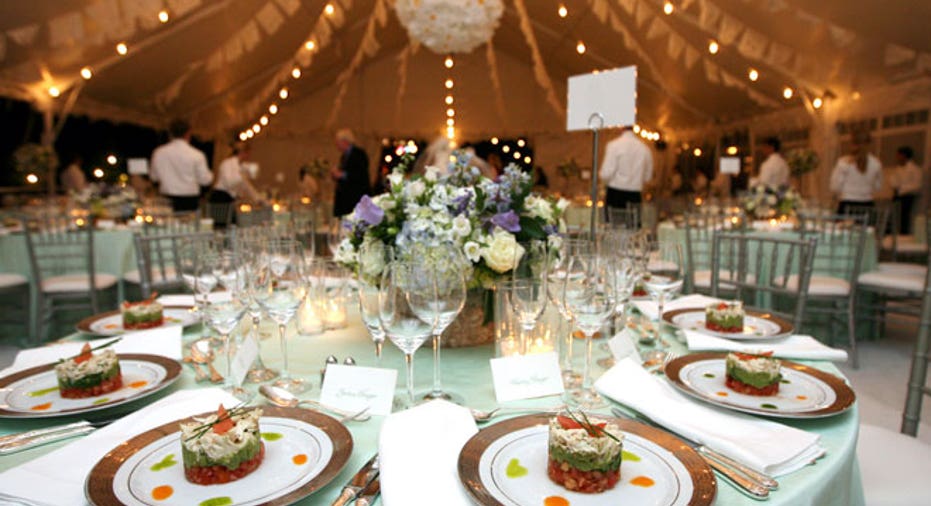What is Wedding Insurance? Do You Need It?

You’ve planned the perfect wedding. Then, out of now where, your venue shuts down six months before your big day, and now you must scramble to find a new space.
“You wanted to celebrate at the original site. Your family wanted to be there. And you’re in love,” says Jolene Rae Harrington, director of creative content at Here Comes the Guide. “What do you do to mitigate your losses, both experiential and financial?”
Even in our uncertain economy, wedding price tags are escalating with the average cost of a wedding exceeding $25,000. With such a high price tag, the wedding insurance business has been rising recently, to protect a couple from unexpected disruptions.
Wedding cancellation/postponement insurance covers catastrophic loss, like a venue going bankrupt or being destroyed by flood or fire. Issues involving the venue are among the most common of catastrophes among customers, says Ed Charlebois vice president of personal insurance at Travelers which underwrites the Wedding Protector Plan. Non-venue related mishaps that can put a crimp in your day are also protected, like the limo driver being a no-show, the wedding cake flopping or the photographer’s hard drive crashing. These may not cause you to cancel, but they come at some cost.
Coverage is fairly standard and competitively priced across the industry. Basic cancellation/postponement coverage can start anywhere from $160 to $200 and increase incrementally depending on the cost of the wedding and this includes protection which also increases incrementally with coverage limits against additional expenses for other categories like glitches with photographers, gifts, lost deposits, etc.
At WedSafe, part of the Aon plc brand, for example, a premium for a $25,000 wedding is about $200; spend $50,000, you’ll pay about a $350 premium, says Steve Lauro, Aon vice president.
You can even get protection for a mega wedding, says Charlebois. For example, cancellation/postponement coverage for a $175,000 wedding would cost $1,025. “That’s pretty reasonable as a percentage of what you’re spending overall,” he says.
And, one rule of thumb all experts suggest: Go online and get a free quote for your wedding.
With unconventional spaces like parks, museums, historic mansions, ranches and/or private estates increasingly being used for weddings, some venues require couples to purchase wedding liability insurance. Most facilities want $1,000,000 to $2,000,000 in extra liability coverage, according to Harrington.
You can purchase insurance up to two years before your wedding, says Charlebois, and, as late as 24 hours before your wedding in most states—though that depends on what you’re buying. That being said, many insurers require that couples purchase insurance 14 days prior to the wedding to cover weather-related events.
“You can’t buy insurance when you’re heading to your destination wedding and a hurricane is racing you to your wedding location,” says Lauro. In fact, “if you’ve done your homework and want to buy insurance, we suggest you make your purchase when you start writing checks for deposits.”
Read the Fine Print
When selecting an insurance plan or committing to a vendor, always read the fine print. “Don’t let happiness stop you from going over important details,” warns Lauro.
Venues often reserve the right to make changes, so make sure all the specifics you want at your wedding are written into the contract, Harrington recommends. “You want peonies on the table, and instead you find dahlias, or you arrive on the day of your wedding and your event has been moved to a different room.”
Each claim is paid on its own merits and vendors must deliver everything that’s written into a contract, says Charlebois.
And, cautions Harrington, if you’re set on a particular site at your venue—say you absolutely have to have your wedding in the barn—be sure you think about all the contingencies that need to be covered. Couples don’t necessarily know the questions to ask of both vendors and insurers. A good rule of thumb, she says: Do your homework by researching similar wedding events, and ask an insurer about some of the related claims experience.
Delegate to a Business Mind
“Couples tend to focus on aesthetics like décor, the gown or the setting,” says Harrington. “It’s wonderful to shoot for a dream wedding, but you still need to consider the more practical elements.” If you don’t have the head for business, delegate to someone who does.”
Lauro suggests every time you write a check to a vendor consider what potentially could go wrong and ask for a back-up plan.
And remember, he cautions. “Even if you do everything right, there could still be a loss.”



















